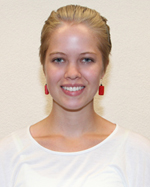

Main navigation | Main content

Rebecca Carlson has received the American Chemical Society Chemical Computing Group Excellence Award. The award includes a travel grant to attend the ACS National Meeting in Boston, Aug. 16-20. Carlson will present a poster at the Computers in Chemistry (COMP) Division Poster Session.
Rebecca is a third-year graduate student working with Professor Laura Gagliardi. Her research focuses on developing new theoretical methods to address fundamental problems in quantum chemistry and also to use these new theoretical methods for studying applications such as those involving catalysis and photochemistry. Many processes in photochemistry and catalysis involve multiconfigurational systems such as transition metals, transition states, and other open shall species. These may be difficult to model accurately, due to computational cost or accuracy of current quantum chemical methods for these types of problems. To address this fundamental problem of modeling multiconfigurational systems, Rebecca is working on developing a new method, Multiconfiguration Pair-Density Functional Theory (MC-PDFT), which is based on a combination of multiconfigurational wave function theory with a new kind of density functional called the on-top density functional. This project is a collaboration between the research groups of Professor Gagliardi and Professor Donald Truhlar. An example of a particular application related to her research where MC-PDFT may have important implications, is in transition metal catalysis. She is working on understanding the catalytic potential of using metal organic frameworks as supports for catalysis. Specifically, she is looking at the oligomerization of ethylene and the conversion of natural gas into methanol.
“Rebecca is working on one of the most challenging open topics in quantum chemistry, namely how to model strongly correlated systems,” said Gagliardi. “What she is doing is relevant to catalysis, photochemistry and, more in general, energy-related problems. She has made incredible progress on this project and the community is very excited about her work and has recognized the relevance of the topic and her outstanding contribution through this award.”